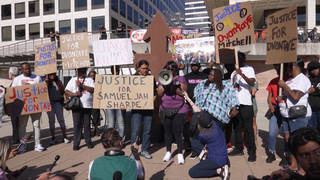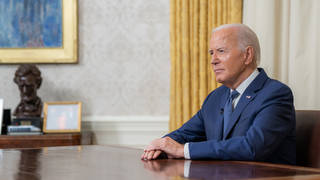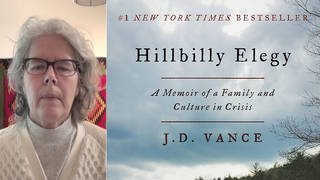This content originally appeared on Democracy Now! and was authored by Democracy Now!.
This post was originally published on Radio Free.
This content originally appeared on Democracy Now! and was authored by Democracy Now!.
This post was originally published on Radio Free.
This content originally appeared on Democracy Now! and was authored by Democracy Now!.
This post was originally published on Radio Free.
This content originally appeared on Democracy Now! and was authored by Democracy Now!.
This post was originally published on Radio Free.

As anger grows in Milwaukee over the police killing of 43-year-old Samuel Sharpe during the Republican National Convention, we speak with his sister, Angelique Sharpe, who says the family is fighting for transparency from the authorities and the full video of the fatal incident. “We really want justice for my brother,” says Angelique, who also explains that her brother’s life had been threatened by a “bully” and that he had actually called the police for help before he was killed. Samuel Sharpe was an unhoused Black man shot 27 times by police on Tuesday — but the officers were from Ohio, part of a deployment of thousands of outside law enforcement members in Wisconsin for the RNC. We are also joined by Wisconsin state Representative Darrin Madison, a Democratic Socialist, who says both Sharpe’s death and the killing of D’Vontaye Mitchell by hotel security guards weeks earlier point to a larger problem of anti-Black violence in Milwaukee.
This content originally appeared on Democracy Now! and was authored by Democracy Now!.
This post was originally published on Radio Free.

The Washington Post reports the word “abortion” was not mentioned a single time from the stage during the first three days of the Republican National Convention. Reporter Amy Littlefield, abortion access correspondent at The Nation, says the silence from Trump and others at this week’s RNC in Milwaukee does not reflect a change in attitude from the Republican Party, which is still fiercely opposed to reproductive rights. “Republicans can read the polls. They know that abortion has triumphed in all seven instances where it’s been on the ballot since the Dobbs decision. They know that a rising number of people support abortion rights,” says Littlefield, who predicts that “abortion is going to have a huge impact on this election” and calls for “a Reproductive Justice New Deal.”
This content originally appeared on Democracy Now! and was authored by Democracy Now!.
This post was originally published on Radio Free.

A march through downtown Milwaukee Thursday called for justice for Samuel Sharpe and D’Vontaye Mitchell, two Black men killed before and during the Republican National Convention amid a massive security buildup. Sharpe was a 43-year-old unhoused Black man who was shot dead by police officers from Ohio who were in Wisconsin as part of a group of 4,500 law enforcement officials in Milwaukee for the RNC. The shooting took place a mile from the RNC’s proceedings. Weeks earlier, security guards at the Hyatt Regency Hotel killed D’Vontaye Mitchell, a 43-year-old Black father who died after security guards pinned him to the ground. Democracy Now! was at the protest, and we feature the voices of grieving family members who spoke out.
This content originally appeared on Democracy Now! and was authored by Democracy Now!.
This post was originally published on Radio Free.
Democracy Now! Friday, July 19, 2024
This content originally appeared on Democracy Now! Audio and was authored by Democracy Now!.
This post was originally published on Radio Free.
This content originally appeared on Democracy Now! and was authored by Democracy Now!.
This post was originally published on Radio Free.
This content originally appeared on Democracy Now! for Broadcasters – HD MP4 and was authored by Democracy Now! for Broadcasters – HD MP4.
This post was originally published on Radio Free.
This content originally appeared on Democracy Now! and was authored by Democracy Now!.
This post was originally published on Radio Free.
This content originally appeared on Democracy Now! and was authored by Democracy Now!.
This post was originally published on Radio Free.
This content originally appeared on Democracy Now! and was authored by Democracy Now!.
This post was originally published on Radio Free.
This content originally appeared on Democracy Now! and was authored by Democracy Now!.
This post was originally published on Radio Free.
This content originally appeared on Democracy Now! and was authored by Democracy Now!.
This post was originally published on Radio Free.
This content originally appeared on Democracy Now! and was authored by Democracy Now!.
This post was originally published on Radio Free.

The Democratic National Committee is moving ahead with a plan to virtually nominate Joe Biden ahead of the Democratic convention in Chicago despite growing calls for him to step aside and as a new Associated Press poll shows nearly two-thirds of Democrats want Biden to withdraw from the race following his disastrous debate with Donald Trump. Top Democrats including Nancy Pelosi and Chuck Schumer are reportedly privately lobbying for Biden to step aside. With Biden as the presidential candidate, “Democrats have a vanishingly thin chance of recapturing the House,” says Chris Lehmann, who rejoins us to discuss the “unprecedented” and contentious fight over Biden’s reelectability occurring within the Democratic Party ahead of its convention next month.
This content originally appeared on Democracy Now! and was authored by Democracy Now!.
This post was originally published on Radio Free.

American historian and the author of White Trash: The 400-Year Untold History of Class in America, Nancy Isenberg, calls Republican vice-presidential nominee J.D. Vance a peddler of the “self-made man myth.” Isenberg criticizes Hilbilly Elegy, the memoir that propelled him to fame, as a deceptive way of selling this myth and the conservative politics it comes with. “Much of what his memoir says tells us nothing about real class conditions,” Isenberg says, pointing to her own historical and sociological research on the rural poor in the United States.
This content originally appeared on Democracy Now! and was authored by Democracy Now!.
This post was originally published on Radio Free.

Politico reporter Ian Ward interviewed Ohio Senator J.D. Vance at length for a recent profile and joins us to discuss Vance’s biography and ideology after he formally accepted the Republican vice-presidential nomination to run with Donald Trump, whom he once staunchly opposed.
This content originally appeared on Democracy Now! and was authored by Democracy Now!.
This post was originally published on Radio Free.

We continue to look at the record of Donald Trump’s vice-presidential running mate, Senator J.D. Vance, with a focus on his foreign policy actions, with Matt Duss of the Center for International Policy, former adviser to Senator Bernie Sanders. Vance is “very aligned with Trump,” says Duss, such as in his support of the Abraham Accords, the Arab-Israeli normalization deal signed under the Trump administration that sought to increase Israel’s power in the region at the expense of Palestinian rights.
This content originally appeared on Democracy Now! and was authored by Democracy Now!.
This post was originally published on Radio Free.

After Ohio Senator J.D. Vance makes his nomination official as the Republican vice-presidential candidate in 2024, we spend the show looking at his record. We begin with a discussion on Vance’s professed economic populism with independent journalist Zaid Jilani and The Nation's Chris Lehmann. Jilani argues Vance's pro-working class image is not only genuine, but that he may also hold enough sway to bring the Republican Party closer to the labor movement. “Big business does fear Vance to some extent,” he says. Lehmann counters, “I don’t see the Republican Party, at the end of the day, moving toward these … redistributive policies,” citing its hostility toward immigrants, who are a major driver of economic growth. “The forgotten working class is going to stay forgotten,” he concludes.
This content originally appeared on Democracy Now! and was authored by Democracy Now!.
This post was originally published on Radio Free.
Headlines for July 18, 2024; Trump’s VP Pick J.D. Vance Espouses Economic Populism But Will He Actually Be a Working-Class Ally?; J.D. Vance Criticizes Biden’s Support for Iraq War in 2003 But Pushes Hawkish Policy on China & Iran; “More Radical Than MAGA”? Politico’s Ian Ward on J.D. Vance & the Future of the Republican Party; “White Trash” Historian Nancy Isenberg on J.D. Vance, “Hillbilly Elegy” & Class in America; COVID Forces Biden Off Campaign Trail as Pressure Grows for Him to Step Aside
This content originally appeared on Democracy Now! Audio and was authored by Democracy Now!.
This post was originally published on Radio Free.
This content originally appeared on Democracy Now! and was authored by Democracy Now!.
This post was originally published on Radio Free.
This content originally appeared on Democracy Now! for Broadcasters – HD MP4 and was authored by Democracy Now! for Broadcasters – HD MP4.
This post was originally published on Radio Free.
This content originally appeared on Democracy Now! and was authored by Democracy Now!.
This post was originally published on Radio Free.
This content originally appeared on Democracy Now! and was authored by Democracy Now!.
This post was originally published on Radio Free.
This content originally appeared on Democracy Now! and was authored by Democracy Now!.
This post was originally published on Radio Free.